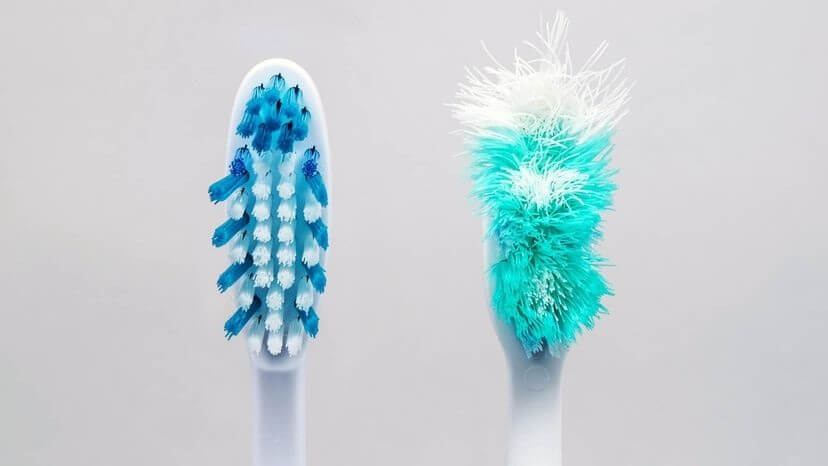
How Often Should You Replace Your Toothbrush?
Healthy teeth and gums contribute to your overall physical wellness, so it's important to switch out your toothbrush regularly.
By: Sharise C. | How Stuff Works
Replacing your toothbrush is one of the simplest tasks you can do to maintain good dental health, but many of us still don’t do it as often as we should.
So how often should you replace yours? It depends on the type of toothbrush you use.
Replacing a Manual vs. Electric Toothbrush
If you brush with a manual toothbrush twice a day for 2 minutes as recommended, pretty much every dentist and the American Dental Association (ADA) say you need to replace your toothbrush every three to four months.
It’s about the same for the head of a powered toothbrush, but it most likely needs swapping out at the 12-weeks mark. That’s because electric toothbrushes often have shorter bristles that tend to wear down more quickly.
But what if you don’t know when you bought your last toothbrush? Should you just replace it? Not necessarily. There are signs that indicate it’s time for a change, whether you use a good old manual toothbrush or an electric.
Do a visual inspection of the bristles and look for signs of any of the following:
- Edges that are beginning to fray or bend
- Matting
- Overall bristle symmetry losing shape
Some toothbrushes have bristles that change colour as they wear down, which provide an obvious visual signal that they need to be replaced.
If you use your toothbrush longer than recommended, the bristles will start to wear and fray, and they won’t be as effective at removing debris and plaque. When too much plaque and food debris linger in your mouth, your risk of tooth decay and gum disease increases.
How to Make Your Toothbrush Last Longer

Here are a few things you can do to keep your toothbrush in good condition between replacements:
- Always rinse your toothbrush after brushing to remove residual toothpaste and food debris.
- Store your toothbrush in a place where it can’t touch the head of another toothbrush and spread germs.
- Store it upright and let it air dry. Never put it in a closed container while it’s wet, as this creates an ideal environment for bacteria and mold to grow.
- Never share toothbrushes, even with your closest loved ones.
Studies suggest toothbrushes can harbour bacteria — even fecal matter — so if you choose to clean yours, the ADA says to soak it in 3% hydrogen peroxide or Listerine mouthwash. That’s because a 2010 study published in the Journal of Dentistry found that both methods reduce bacterial load by 85%.
You also can use a toothbrush sanitizing device, but look for one that is cleared by the U.S. Food and Drug Administration (FDA).
How to Maintain Good Oral Hygiene
If you’re still using a manual brush, consider switching to a powered version. Electric toothbrushes have been proven to clean teeth and gums better than manual toothbrushes, promoting healthier gums and less tooth decay. It’s likely because of the various movements they have that you don’t get when using a manual brush (e.g., side-to-side, counter oscillation, rotation oscillation, circular).
So, on your next trip the neighbourhood store, just grab a new toothbrush, and maybe make it an electric one. And of course, visit your dentist for check-ups and cleanings on a regular basis. You’ll probably leave with a free toothbrush to boot.
Now That’s Gross
Close the toilet lid when you flush! Toothbrushes have been shown to contain fecal coliform bacteria that can be released into the air when the toilet is flushed.
* * *
NEXT UP!
B Vitamins: Your Brain’s Natural Repair Kit
A patient—let’s call her Jane—presents with a startling problem: Despite once being a functioning member of society, her life has been upended. She is now unable to form new memories, becomes easily confused, and even struggles to walk steadily.
Following her husband’s death, our patient has struggled with alcohol addiction for five years, which has led to her developing what is known as Korsakoff’s syndrome. In this lamentable condition, vitamin B1 (thiamine) deficiency leads to the slow degeneration of proper brain function.
One may retain a past, but without the essential nutrients to ensure coordination of the nervous system, the future becomes bleaker.
* * *
READ MORE: Can A Dental Infection Cause A Massive Heart Attack?
Read more on Dental Care: How To Treat Periodontitis With Diet
Enjoyed it? Please take a moment to show your support for Collective Spark.
We’d love to hear from you! If you have a comment about this article or if you have a tip for a future Collective Spark Story please let us know below in the comment section.

Pain Relief – It eliminates the infection, relieving severe toothaches and sensitivity.